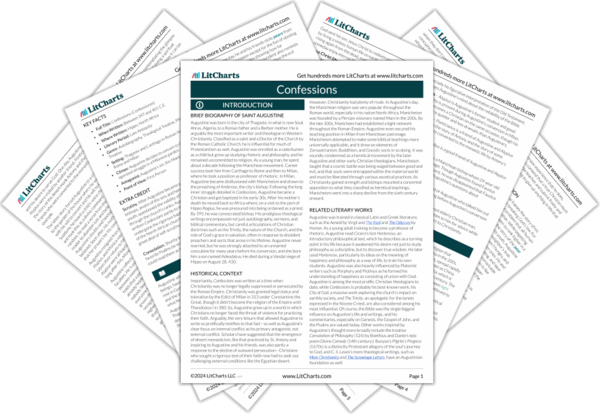Welcome to the LitCharts study guide on Saint Augustine's Confessions. Created by the original team behind SparkNotes, LitCharts are the world's best literature guides.
Confessions: Introduction
Confessions: Plot Summary
Confessions: Detailed Summary & Analysis
Confessions: Themes
Confessions: Quotes
Confessions: Characters
Confessions: Terms
Confessions: Symbols
Confessions: Theme Wheel
Brief Biography of Saint Augustine

Historical Context of Confessions
Other Books Related to Confessions
Key Facts about Confessions
- Full Title: Confessions (Confessiones)
- When Written: Between 397 and 401 C.E.
- Where Written: Hippo, North Africa
- Literary Period: Late Antiquity
- Genre: Autobiography, Theological Treatise, Philosophical Treatise
- Setting: Thagaste and Carthage in Roman North Africa; Rome and Milan
- Climax: Augustine decides to convert to Christianity after an agonized struggle in a Milanese garden.
- Antagonist: Augustine’s sin; the Manichees
- Point of View: First Person
Extra Credit for Confessions
Scrutiny. After Augustine became a bishop, some North African bishops, aware of the sins and heresies he embraced in his youth, questioned the validity of his baptism and promotion through the church’s ranks. Augustine is thought to have written Confessions partly to show that, even though he hadn’t undergone the rigorous baptismal preparation that was typical of the North African church, he had nevertheless undergone a great deal of self-scrutiny in his journey toward Christianity.
Consolation. Shortly before his death, Augustine asked that his favorite Psalms be written on the walls in big letters so that he could read them as he died.







